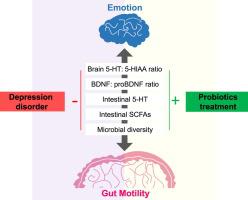Journal of Advanced Research ( IF 10.7 ) Pub Date : 2022-05-11 , DOI: 10.1016/j.jare.2022.05.003 Peijun Tian 1 , Renying Zou 1 , Luyao Wang 1 , Ying Chen 1 , Xin Qian 1 , Jianxin Zhao 2 , Hao Zhang 3 , Long Qian 4 , Qun Wang 4 , Gang Wang 5 , Wei Chen 6

|
Introduction
Major depressive disorder (MDD) is a leading global psychiatric disease. MDD is highly comorbid with gastrointestinal abnormalities, such as gut motility dysfunction. An effective strategy to manage depression and its accompanying gastrointestinal symptoms is warranted.
Objectives
Three probiotic strains (Bifidobacterium breve CCFM1025, Bifidobacterium longum CCFM687, and Pediococcus acidilactici CCFM6432) had previously been validated in mice to possess antidepressant-like potential. This study investigated the potential psychotropic effects of a combined three-strain probiotic intervention for human MDD patients. The mechanism of action was further investigated in the stress-induced depression mice model.
Methods
MDD patients were given a freeze-dried, mixed probiotic formula for four weeks. The patients’ psychometric and gastrointestinal conditions were evaluated using clinical rating scales before and after treatment. Their gut microbiome was also analysed using 16S rRNA gene amplicon sequencing. The mechanisms underlying the beneficial probiotic effects were determined using a chronic stress-induced depressive mouse model.
Results
Multi-probiotics significantly reduced depression scores, and to a greater extent than the placebo (based on the Hamilton Depression Rating, Montgomery-Asberg Depression Rating, and Brief Psychiatric Rating Scales). Multi-probiotics also significantly improved the patients’ gastrointestinal functions (based on self-evaluation using the Gastrointestinal Symptom Rating Scale). Serotonergic system modification was demonstrated as the key mechanism behind the probiotics’ benefits for the brain and the gut.
Conclusion
Our findings suggest a novel and promising treatment to manage MDD and accompanying gut motility problems, and provide options for treating other gut-brain axis-related disorders.
中文翻译:

多种益生菌通过血清素能系统调节改善重度抑郁症和伴随的胃肠道综合征
介绍
重度抑郁症 (MDD) 是一种全球性的主要精神疾病。MDD 与胃肠道异常高度共存,例如肠道运动功能障碍。需要一种有效的策略来管理抑郁症及其伴随的胃肠道症状。
目标
三种益生菌菌株(短双歧杆菌CCFM1025、长双歧杆菌CCFM687 和嗜酸片球菌CCFM6432)先前已在小鼠身上得到验证,具有抗抑郁样潜力。本研究调查了联合三菌株益生菌干预对人类重度抑郁症患者的潜在精神作用。在应激诱导的抑郁症小鼠模型中进一步研究了作用机制。
方法
MDD 患者被给予冷冻干燥的混合益生菌配方四个星期。在治疗前后使用临床评定量表评估患者的心理和胃肠道状况。还使用 16S rRNA 基因扩增子测序分析了他们的肠道微生物组。使用慢性应激诱导的抑郁小鼠模型确定有益益生菌作用的潜在机制。
结果
多种益生菌显着降低了抑郁评分,并且比安慰剂的程度更大(基于汉密尔顿抑郁评分、蒙哥马利-阿斯伯格抑郁评分和简明精神病学评定量表)。多种益生菌还显着改善了患者的胃肠功能(基于使用胃肠道症状评定量表进行的自我评估)。血清素能系统修饰被证明是益生菌对大脑和肠道有益的关键机制。
结论
我们的研究结果提出了一种新颖且有前途的治疗方法来管理 MDD 和伴随的肠道运动问题,并为治疗其他肠-脑轴相关疾病提供了选择。



























 京公网安备 11010802027423号
京公网安备 11010802027423号